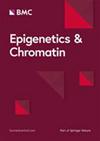组蛋白蛋白形式分析揭示了成年小鼠棕色脂肪组织对冷应激反应的表观遗传变化
IF 3.5
2区 生物学
Q1 GENETICS & HEREDITY
引用次数: 0
摘要
棕色脂肪组织(BAT)对生热反应的调节是能量平衡的重要组成部分,对肥胖症和糖尿病的治疗具有重要意义。我们对 RNA-Seq 数据的初步分析发现了许多代表表观遗传修饰因子的节点,这些修饰因子在 BAT 中会随着慢性生热激活而发生改变。因此,我们假设慢性生热激活会广泛改变 BAT 中 DNA 和组蛋白的表观遗传修饰。为了了解 BAT 的功能是如何受到表观遗传调控的,我们开发了一种新方法,首次对 BAT 中的组蛋白修饰进行了无偏见的自上而下的蛋白质组学定量分析,并用多组学方法验证了我们的结果。为了验证我们的假设,野生型雄性 C57BL/6J 小鼠被长期饲养在恒温(TN,28°C)、低温/室温(RT,22°C)或严寒(SC,8°C)条件下,并对 BAT 的 DNA 甲基化和组蛋白修饰进行了分析。基因组 DNA 启动子和基因内区域的甲基化会随着长期暴露于寒冷环境而减少。DNA甲基化和RNA表达数据集的整合表明,DNA的表观遗传修饰在调控基因表达以应对寒冷中发挥作用。在 BAT 中,我们观察到组蛋白 H3.2 和 H4 的大量乙酰化增加、赖氨酸 9 的二甲基化和三甲基化(K9me2 和 K9me3)的组蛋白 H3.2 蛋白形式增加以及赖氨酸 16 的乙酰化(K16ac)的组蛋白 H4 蛋白形式增加。我们的研究结果揭示了小鼠 BAT 在不同程度的慢性寒冷刺激下的全局性表观遗传调控转录 "开 "和 "关 "信号,并建立了一种定量研究 BAT 组蛋白的新方法,从而可以直接进行比较,破译生热反应过程中的机理变化。此外,我们还提供了组蛋白 PTM 和蛋白形式定量、RNA 剪接、RRBS 和转录足迹数据集,作为未来研究的资源。本文章由计算机程序翻译,如有差异,请以英文原文为准。
Histone proteoform analysis reveals epigenetic changes in adult mouse brown adipose tissue in response to cold stress
Regulation of the thermogenic response by brown adipose tissue (BAT) is an important component of energy homeostasis with implications for the treatment of obesity and diabetes. Our preliminary analyses of RNA-Seq data uncovered many nodes representing epigenetic modifiers that are altered in BAT in response to chronic thermogenic activation. Thus, we hypothesized that chronic thermogenic activation broadly alters epigenetic modifications of DNA and histones in BAT. Motivated to understand how BAT function is regulated epigenetically, we developed a novel method for the first-ever unbiased top-down proteomic quantitation of histone modifications in BAT and validated our results with a multi-omic approach. To test our hypothesis, wildtype male C57BL/6J mice were housed under chronic conditions of thermoneutral temperature (TN, 28°C), mild cold/room temperature (RT, 22°C), or severe cold (SC, 8°C) and BAT was analyzed for DNA methylation and histone modifications. Methylation of promoters and intragenic regions in genomic DNA decrease in response to chronic cold exposure. Integration of DNA methylation and RNA expression datasets suggest a role for epigenetic modification of DNA in regulation of gene expression in response to cold. In response to cold housing, we observe increased bulk acetylation of histones H3.2 and H4, increased histone H3.2 proteoforms with di- and trimethylation of lysine 9 (K9me2 and K9me3), and increased histone H4 proteoforms with acetylation of lysine 16 (K16ac) in BAT. Our results reveal global epigenetically-regulated transcriptional “on” and “off” signals in murine BAT in response to varying degrees of chronic cold stimuli and establish a novel methodology to quantitatively study histones in BAT, allowing for direct comparisons to decipher mechanistic changes during the thermogenic response. Additionally, we make histone PTM and proteoform quantitation, RNA splicing, RRBS, and transcriptional footprint datasets available as a resource for future research.
求助全文
通过发布文献求助,成功后即可免费获取论文全文。
去求助
来源期刊

Epigenetics & Chromatin
GENETICS & HEREDITY-
CiteScore
7.00
自引率
0.00%
发文量
35
审稿时长
1 months
期刊介绍:
Epigenetics & Chromatin is a peer-reviewed, open access, online journal that publishes research, and reviews, providing novel insights into epigenetic inheritance and chromatin-based interactions. The journal aims to understand how gene and chromosomal elements are regulated and their activities maintained during processes such as cell division, differentiation and environmental alteration.
 求助内容:
求助内容: 应助结果提醒方式:
应助结果提醒方式:


